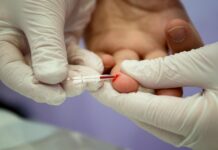 Researchers have sug-gested a way to predict when a woman will have her final menstrual period.
Researchers have sug-gested a way to predict when a woman will have her final menstrual period.
The findings may help women and physicians gauge the onset of menopause-related bone loss, which usually begins a year prior to the last period.
Lead author Dr. Gail Greendale, professor of medicine in the division of geriatrics at the David Geffen School of Medicine at UCLA, said that the researchers used women’s ages, menstrual bleeding patterns and measurements of hormone levels to estimate the amount of time until they were likely to reach menopause.
The researchers used information collected annually for up to 11 years on 554 women, including Caucasians, African Americans, Hispanics and those of Chinese and Japanese descent, participating in the multi-site, multi-ethnic Study of Women’s Health Across the Nation.
Participating women were between the ages of 42 to 53, had an intact uterus and at least one ovary, were not using any medicationsffecting ovarian function and had experienced at least one menstrual period in the prior three months.
The researchers measured levels of estradiol (E2), a hormone produced by the ovaries, and follicle stimulating hormone (FSH) that comes from the pituitary gland and triggers the production of eggs.
FSH starts increasing and E2 starts decreasing about two years prior to the final menstrual period, or about a year before bone loss and cardiovascular risk factors rise.
The study found that the levels of the two hormones can be used to estimate whether women were within two years of beginning their final menstrual period, within one year or beyond their final period.
The study has been published in Journal of Clinical Endocrinology and Metabolism.






